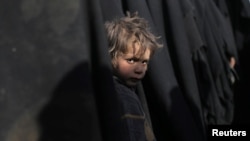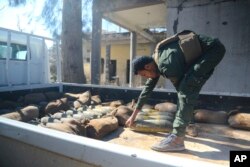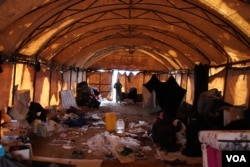Last year was the deadliest yet for children in Syria, with more than 1,100 killed by fighting, the United Nations said on Monday, with the bloody conflict about to enter its ninth year.
U.N. children's agency UNICEF said it had been able to verify 1,106 child deaths from the fighting in 2018 — the highest annual toll since war broke out in 2011 — but that the true figure was likely to be much higher
"Today there exists an alarming misconception that the conflict in Syria is drawing quickly to a close — it is not," said executive director Henrietta Fore in a statement. "Children in parts of the country remain in as much danger as at any other time during the eight-year conflict."
The biggest cause of child casualties was unexploded ordnance, which accounted for 434 deaths and injuries last year, UNICEF said.
Syria's war has killed an estimated half a million people and driven about 5.6 million people out of the country. Another 6.6 million people still in the country have lost or fled their homes.
Turkey and Russia, one of the Syrian government's staunchest allies, brokered a deal in September to create a demilitarized zone in the northwest Idlib region that would be free of all heavy weapons and jihadist fighters.
The deal helped avert a government assault on the region, the last major bastion of opponents of President Bashar al-Assad.
But Fore said she was concerned about the intensification of violence in Idlib, where 59 children have been reported killed in recent weeks.
"UNICEF again reminds parties to the conflict and the global community that it is the country's children who have suffered most and have the most to lose. Each day the conflict continues is another day stolen from their childhood," said Fore.
Since January about 60 children have died trying to get to al-Hol camp in northeastern Syria, which is now home to more than 65,000 people fleeing Islamic State, according to the U.N.
Thousands have flooded al-Hol camp as the U.S.-backed Syrian Democratic Forces (SDF) lay siege to the last vestige of Islamic State's territorial rule at the besieged village of Baghouz near the Iraqi border.
"Syria is still one of the most dangerous places in the world to be a child, with ongoing violence, insecurity and displacement," said Caroline Anning, spokeswoman for Save the Children.
"Even where conflict has subsided, the risk from explosive remnants of war like landmines and cluster munitions is growing," she told the Thomson Reuters Foundation in an emailed statement.







